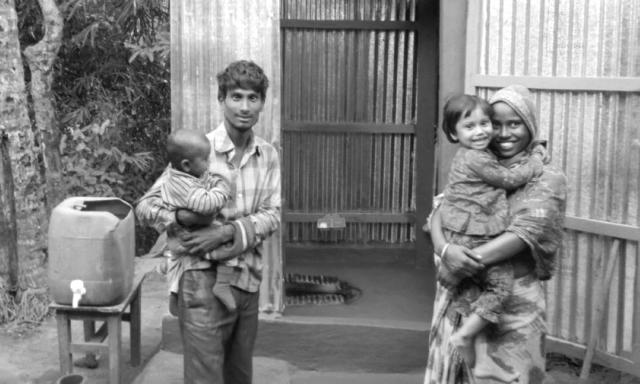
Sanitation Marketing Systems in Bangladesh: A Public-Private Partnership
Public-Private Partnerships That Are Changing the World
The Darden School of Business’ Institute for Business in Society partners with Concordia and the U.S. Department of State Secretary’s Office of Global Partnerships to present the annual P3 Impact Award, which recognizes leading public-private partnerships that improve communities around the world. This year’s award will be presented at the Concordia Annual Summit 18–19 September 2017. The five finalists will be highlighted on Darden Ideas to Action on Fridays leading up to the event.
The Partnership:
Sanitation Marketing Systems in Bangladesh (SanMarkS Project)
The Partners:
- Bangladesh Department of Public Health Engineering (DPHE)
- iDE
- Rangpur Foundry Limited (RFL)
- Swiss Agency for Development and Cooperation
- UNICEF
The Social Challenge:
Health and Sanitation
Bangladesh has substantially improved access to sanitation and virtually eliminated open-air defecation. However, up to half of its latrines are broken or low quality, resulting in the spread of diseases that cause an estimated 100,000 deaths every year and health losses of over 4 billion dollars, or 5 percent of GDP. Central to this problem is the limited availability of quality latrines and the mistaken belief by households that their broken latrines are not a problem.
The Idea and the Action:
The partnership, Sanitation Marketing Systems in Bangladesh (SanMarkS), takes a market systems approach that addresses both the demand and supply of hygienic latrines. On the demand side, SanMarkS conducted extensive market segmentation research, assessing the incomes and assets of different consumer groups. Based on this research, the team estimates that only about 12 percent of people in need of improved latrines require some form of subsidy assistance. The remaining 88 percent can buy their own latrines given adequate product options with a diversity of price points and access to financing for those with lower income levels. SanMarkS’ trained local latrine producers and sales agents generate demand for hygienic latrines through last mile marketing, directly contacting small, targeted audiences. This is supported by above-the-line mass media marketing by larger manufacturers, as well as the awareness-raising efforts of local governments and NGOs.
On the supply side, SanMarkS helps manufacturing firms to design products that meet the needs and preferences of the different market segments, based on consumer research. By mass producing latrine parts that solve local-level human error in installation and use, the partnership helps to sustainably address public health issues. The movement of products through a chain of private players (factories to regional dealers to local latrine producers to households) ensures sustainable supply of quality latrine products, while creating business opportunities for companies and local entrepreneurs.
The current partnership with Rangpur Foundry Limited (RFL) has resulted in products that are suitable for midrange consumer groups. Going forward, SanMarkS will engage in new partnerships with additional firms to develop products that are suitable for other market segments. Healthy market competition will further support the sustainable supply of hygienic latrines and also provide a variety of product options for consumers of varying means. To ensure that these firms adhere to a certain level of quality, Bangladesh Department of Public Health Engineering (DPHE) is drafting new national guidelines for the sanitation market, to ensure standards like fair pricing and latrine quality control.
The Impact:
As of June 2017, the partnership had trained 340 latrine producers — 32 percent of whom are women — who sold over 37,000 improved latrines. Long-term social and economic impacts include improved health and wages saved from avoiding illness. Total savings are estimated at $141 per household per year. By focusing on the entire market system, the partnership aims to reach beyond the original project target of 90,000 households. This means linking parties along the supply chain to move products from factories to households. Many of these parties are local entrepreneurs — masons, bicycle-van pullers, door-to-door sales agents — who are not necessarily the most impoverished but still fall into a lower socio-economic category. The formalization of the sanitation market creates jobs for these people, so the impact goes beyond the provision of sanitation products to affect livelihoods as well.
The Faculty Insight:
When addressing a social challenge by improving an existing solution or product, an understanding of the entire ecosystem is necessary to be effective. It is necessary to review the supply chain of the existing product to determine where innovations and improvements are needed. By examining both the supply and demand, this partnership must consider all stakeholders within the supply chain to ensure greater success.
Without a clear primary demand from the consumer, there would be no market for the improved product. In this situation, establishing demand requires changing the behavior of not only the consumer, but other stakeholders as well. This partnership uses market segmentation to identify effective strategies and incentives to change these behaviors. In order to build a sustainable market for the improved product, these incentives must align, and the partnership cannot solely rely on subsidies or other external inputs.














